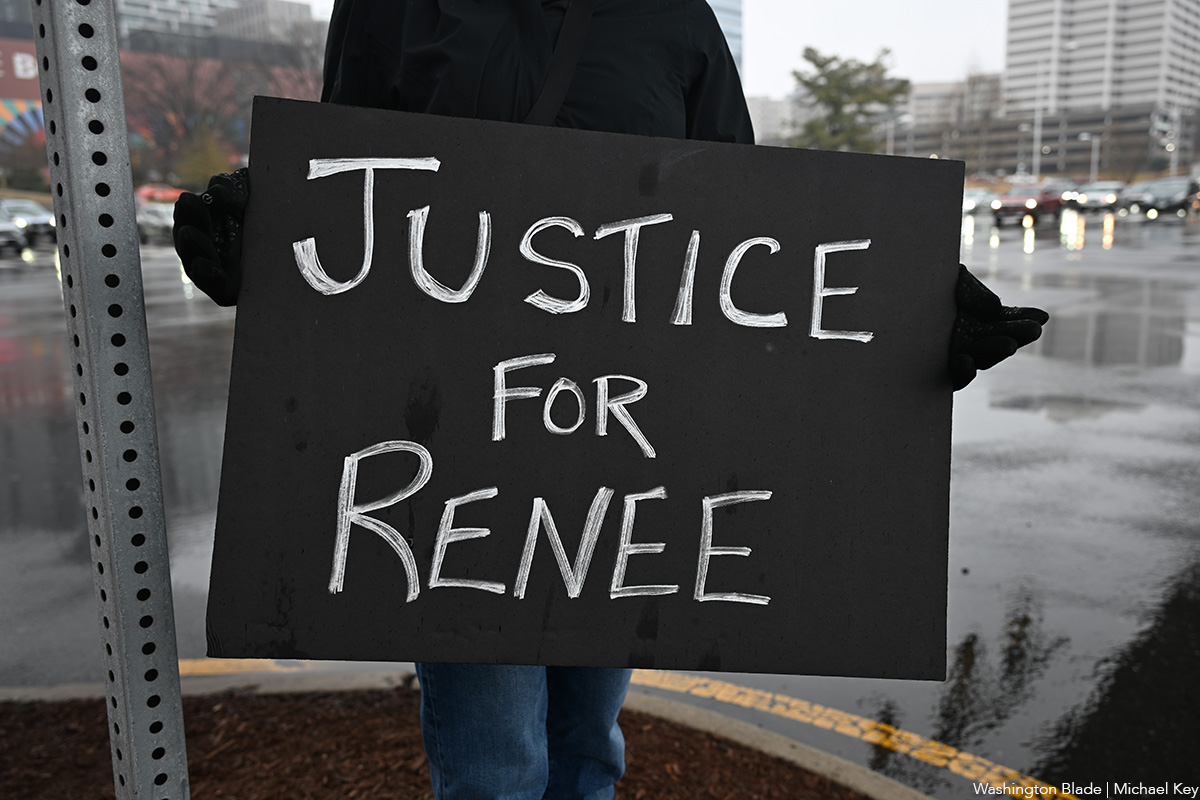Opinions
Patrick Mara for City Council
GOP candidate is longtime gay rights supporter

Two weeks ago, fellow Washington Blade contributor Peter Rosenstein took to these pages to present his strongest case for why the District’s LGBT community shouldn’t vote for Patrick Mara in the April 23 special election for an At-Large D.C. Council seat: Mara, a socially moderate Republican who’s a strong supporter of gay rights, attended the party’s convention in Tampa and supported Mitt Romney for president.
Consider me underwhelmed.
If Rosenstein wishes to make the case that the gay community can’t support any candidate for office who has supported another candidate that doesn’t support gay rights, he’ll have disqualified anyone in the current field who’s been supportive of Council member Marion Barry.
Instead of entertaining Rosenstein’s arbitrary and unreasonable standard for casting your vote, consider Mara’s stance on just two major local issues that affect LGBT voters in their daily lives.
The first is marriage equality, which is settled law in the District of Columbia thanks in part to Mara’s efforts. When the Council had public hearings on the matter, nearly 300 people signed up to testify. Then, as a board member of the D.C. chapter of Log Cabin Republicans, I testified. But as a regular citizen – a straight one at that – so did Patrick Mara. He even took the additional step of lobbying conservative members of Congress not to oppose the District’s efforts.
All of the candidates running today say that, were they on the Council back in 2009, they would have voted to support bringing marriage equality to the District. That may be true, but only one of them—Pat Mara—took direct action to make it so.
The other issue is home rule. The Home Rule Act requires affirmative congressional action with respect to the entire District budget. So, for instance, if there’s a federal shutdown, that affects the District’s use of its own funds. It also deprives D.C. citizens of full voting rights in Congress, even though we pay federal taxes. Mara has long been a supporter of giving the District budget authority and voting rights, both as a board member of D.C. Vote and as a strong advocate within the party for including congressional representation for the District in the national Republican Party platform.
The facts speak for themselves: Patrick Mara is a moderate Republican with genuine cross-over appeal. The fact that the Gertrude Stein Democratic Club actually met to discuss allowing him to address their membership speaks volumes to that appeal, which surely makes partisans like Rosenstein nervous.
Mara is running an excellent grassroots campaign doing it the old-fashioned way — going door to door and meeting the voters. And he has a vision for education and ethics reform that all voters can get behind.
Robert Turner is executive director of the District of Columbia Republican Party and former president of the D.C. chapter of Log Cabin Republicans. Reach him at [email protected] or @RobertTurnerDC.
Greenland
The Greenland lesson for LGBTQ people
Playbook is the same for our community and Europeans

I understand my own geopolitical limits and don’t pretend to know how Europeans should respond to U.S. threats to seize Greenland or retaliate against anyone who opposes them. However, as I mentioned in March, it’s clear that for Europeans and LGBTQ+ people alike, hug-and-kiss diplomacy is over.
In practice, that means responding to the U.S. administration’s provocations with dialogue, human‑rights rhetoric, and reasoning may now be counterproductive. It looks weak. At some point, Europeans will have to draw a line and show how bullying allies and breaking international agreements carry a cost — and that the cost is unpredictable. On the surface, they have few options; like LGBTQ+ communities, they are very behind in raw power and took too long to wake up. But they still have leverage, and they can still inflict harm.
Maybe it is time for them to call the bluff. America has a great deal to lose, not least its reputation and credibility on the world stage. Stephen Miller and Pete Hegseth, with all their bravado, obviously underestimate both the short‑ and long‑term geopolitical price of ridicule. Force the United States to contemplate sending troops into an ally’s territory, and let the consequences play out in international opinion, institutions, and markets.
In the United States, LGBTQ+ communities have already endured a cascade of humiliations and live under constant threat of more. In 2025 our symbols and heroes were systematically erased or defaced: the USNS Harvey Milk was quietly renamed after a straight war hero, Admiral Rachel Levine’s title and image were scrubbed from official materials, Pride flags were banned from public buildings, World AIDS Day events were defunded or stripped of queer content, the Orlando memorial and other sites of mourning were targeted, the U.S. lead a campaign against LGBTQ+ language at the U.N., and rainbow crosswalks were literally ripped up or painted over. We cannot simply register our distress; we must articulate a response.
In practice, that means being intentional and focused. We should select a few unmistakable examples: a company that visibly broke faith with us, a vulnerable political figure whose actions demand consequences, and an institution that depends on constituencies that still need us. The tools matter less than the concentration of force — boycotts, shaming, targeted campaigning all qualify — so long as crossing certain lines produces visible, memorable costs.
A friend suggested we create what he called a “c***t committee.” I liked the discipline it implies: a deliberate, collective decision to carefully select a few targets and follow through. We need a win badly in 2026.
These thoughts are part of a broader reflection on the character of our movement I’d like to explore in the coming months. My friends know that anger and sarcasm carried me for a long time, but eventually delivered diminishing returns. I am incrementally changing these aspects of my character that stand in the way of my goals. The movement is in a similar place: the tactics that served us best are losing effectiveness because the terrain has shifted. The Greenland moment clarifies that we must have a two-pronged approach: building long-term power and, in the short term, punching a few people in the nose.
Opinions
Media obsess over ‘Heated Rivalry’ sex but ignore problem of homophobia in sports
4 major men’s leagues lack gay representation 13 years after Jason Collins came out

The mainstream media are agog over “Heated Rivalry,” the surprise hit HBO Max limited series about two professional hockey players who fall in love.
The show’s stars, Connor Storrie (Ilya) and Hudson Williams (Shane), are everywhere — red carpets, award shows, morning news and late night shows. Female fans lined up for hours to catch a glimpse of Storrie, who appeared on the “Today” show last week.
The interviews and coverage predictably involve lots of innuendo and snickering about the graphic sex scenes in the show. Storrie and Williams have played coy about their real-life sexual orientation, a subject of debate among some gay fans who would prefer they own their sexuality if, in fact, they are gay.
But the big issue ignored by the media that the show tackles is the crippling effect of homophobia and the closet — not just on professional athletes but on anyone who isn’t comfortable being out at work. And it’s a growing problem given the hostile Trump administration. Attacks on LGBTQ people and the roll back of DEI and related protections are driving many Americans back into the closet, especially in D.C.’s large federal workforce.
And the mainstream media seem totally unaware that there has never been an openly gay NHL player. Hell, there’s never even been a retired NHL player who came out.
It’s a sad fact that I would not have predicted 13 years ago when Jason Collins bravely came out publicly while playing in the NBA, the first male athlete in the big four U.S. sports to do so. His announcement was widely covered in the mainstream media and Collins was even named to Time magazine’s “100 Most Influential People” list in 2014.
Then in February 2014, Michael Sam became the first openly gay player to be drafted into the NFL. He was released before the season began and did not play. But still, Sam’s decision to come out was celebrated. It felt like professional male sports was changing and finally shaking off its ingrained homophobia. Many of us awaited a flood of young professional athletes coming out publicly. And we waited. And waited. Then, seven years later, in June 2021, Carl Nassib came out, becoming the first active NFL player to do so. He was with the Las Vegas Raiders at the time and also became the first out player to play in the playoffs. He was released in the offseason and picked up by the Tampa Bay Buccaneers in 2022 and retired the following year.
And that is the short history of out professional male athletes in the big four U.S. sports. (Women’s sports is a different story with many examples of out lesbian and bi players.)
Sure, some pro athletes have come out after retiring, most notably Billy Bean, who went on to a long and successful career advocating from within for gay representation in Major League Baseball as the league’s vice president and ambassador for inclusion and later as senior vice president and special assistant to the commissioner.
But that’s a sorry record and professional sports leagues should redouble their efforts at making gay players (and fans) feel welcome. From fully embracing Pride nights again to adopting zero tolerance policies for hate speech, there’s much more work to be done to make it easier for pro male athletes to come out.
“Heated Rivalry” star Williams recently told an interviewer that he has received private messages from closeted active pro athletes in multiple sports who don’t feel they can come out. How sad that in 2026, even the most successful (and wealthy) among us still feel compelled to hide in the closet.
Let’s hope that “Heated Rivalry,” which has been renewed for a second season, sparks a more enlightened conversation about the closet and the need to foster affirming workplaces in professional sports and beyond.
Kevin Naff is editor of the Washington Blade. Reach him at [email protected].
Opinions
Do not forget that Renee Good was queer
Far-right media link shooting victim’s sexuality to her protest of ICE

Please do not forget that Renee Nicole Good was a queer woman.
Last week, Good, a 37-year-old American citizen, was shot and killed by a United States Immigration and Customs Enforcement agent in Minneapolis. Her wife Rebecca Good was present when the ICE agent shot her, standing outside their car. In the immediate aftermath, Minneapolis erupted with protests aimed at ICE in the city and Republican officials, including President Donald Trump and Vice President JD Vance, who argued the shooting was justified as an act of self-defense.
In a press conference held this past Thursday, Vance told reporters that Good was “a victim of left-wing ideology.” “I can believe that her death is a tragedy,” Vance said,” while also recognizing that it is a tragedy of her own making.” Many criticized Vance’s statement, especially given how he blamed “left-wing extremism” for Charlie Kirk’s death in September on a Utah campus and Vance himself doubled down on condemning those who were celebrating the far-right podcaster’s fatal shooting.
Department of Homeland Security Secretary Kristi Noem implied that Good was a domestic terrorist while Fox News host Jesse Watters said that “the woman who lost her life was a self-proclaimed poet from Colorado with pronouns in her bio.”
Laura Loomer, another far-right Trump supporter, tweeted, “‘She/her.’ Literally every time,” in response to what is believed to be Good’s Instagram account. Loomer and Watters both pointed out her pronouns are somehow part of the reason she was tied to ICE-related violence.
As these comments from far right pundits show, far-right media coverage was quick to connect Good’s queerness to her work to inhibit ICE activity in Minneapolis.
But while far-right news outlets highlighting Good’s queerness, centrist and even leftist news outlets also erased her wife’s experience, featuring interviews with Good’s mom and ex-husband but not her wife who was present for the shooting, feeding into the narrative that she was an “innocent” white mother while denying Good’s own agency in mobilizing for immigrants in her community.
Nobody should be shot by government agencies ever, and these news outlets do not need to play into the construction of an “innocent” white woman for people to be outraged by her death. In fact, in doing so and denying Good’s queerness, they deny the way in which Good’s identity likely affected the way she interacted with the police. For queer and trans people, police are not safe people–in fact, Good’s last words deescalating the situation reflect the ways that homophobia and misogyny prime queer women, and all women to placate men’s emotions.
And it still didn’t work. After shooting her, the ICE agent called her a “fucking bitch,” in front of her wife who was kept away from Good while she bled out in her car.
When the media reinforces the narrative that she was an “innocent” mother, it reinforces the same sexism and racism that allows police brutality to continue.
In an interview, author of the book After Purity released this past December, Sara Moslener said that “White womanhood has been constructed to require that white women sort of maintain purity within themselves as a way to maintain the purity within themselves as a way to maintain the purity of, the innocence of, the nation state. When the purity movement resurfaced in the 1990s, it was this recapitulation of the 19th century nation of sexual purity that was highly racialized.”
“It wasn’t something that was accessible to enslaved women, to other women of color, to immigrant women. It was this ideal of true womanhood that became connected to this idea of a strong nationstate. That rhetoric was then used to justify racial terror lynchings. If white women were threatened, you know, physically, bodily, culturally, they have the right to claim things. This was often used as a guise to justify violence and murder, especially against Black men. It even ties to the concept of Karen and the entitlement of white women, where they can weaponize their vulnerability,” Moslener said.
Good’s shooting for many people was a breaking point for this very reason — because it represented the first time that they had witnessed a white person killed by an ICE agent or a member of the police.
For some, their whiteness had been a source of safety because of the privilege of their skin color, or so they thought until Good’s murder this past week. In the aftermath, they are rethinking if this privilege will continue to protect them and what it can mean in a world where violence against white women’s bodies has long caused social backlash.
This is not a reason to stop fighting — Good was not the first person killed by ICE, not even the first person killed by ICE in 2026, but her whiteness is one of the central reasons that it incited outrage — because of a society that privileges and protects white women’s bodies. To describe Good as solely an “innocent” white woman, to deny her queerness, is to play into this performance of outrage about the brutalization of white women’s bodies.
If discussions of Good’s queerness — and persistent queerphobia against queer women — is not considered in our outrage, in our protests, we feed right into the same narratives that mean some police brutality, especially that against queer and trans people and people of color, goes completely unreported and unchallenged.
This is state-sanctioned violence, and in the immediate aftermath of Good’s death, the Trump administration has demanded that people deny the evidence of their eyes and ears, has pushed the narrative that Good weaponized her vehicle against an ICE agent and that agent fatally shooting her was an act of self defense. This is categorically false but denying what we know to be true, what we can witness ourselves and understand, is the final step in fascism armed and funded by the government.
But let’s be frank: This is not the first time that the American police or a government agent has murdered an unarmed person. Just under six years ago, George Floyd was murdered by police officers in the same city — his death was a breaking point for many who had witnessed police brutality against people of color.
While people are eager to say Good’s name, we cannot say or remember her without remembering and saying the names of Black and Brown men and women, especially disabled people of color, who have been murdered in the hundreds by the police. Their names are often said, their murders often go unquestioned.
People have been and will continue to say Good’s name largely because she was a white woman but the names of Black and Brown people go unsaid and unrecognized because of a system that performs outrage about violence against white bodies. What Good’s murder realized was how a system built on the protection of white women — a Christian nationalism committed to Social Purity — will still sacrifice white women who refuse to fall in line.
Six federal prosecutors in Minnesota resigned this week over the Justice Department’s push to investigate Good’s widow. Among them was Joseph Thompson, a career federal prosecutor, who objected to investigating Good’s wife as well as the department’s refusal to investigate whether the shooting was lawful.
In the signs, in the protests, in the prayers and pleas that you say and make in the aftermath of Good’s murder, do not deny her queerness, do not deny who she was and do not deny the work she did because in performing outrage against the murder of an “innocent” white mother we replicate the same systems of harm that hurt us all.
Emma Cieslik is a museum worker and public historian.
-

 Colombia5 days ago
Colombia5 days agoGay Venezuelan opposition leader: Country’s future uncertain after Maduro ouster
-

 Maryland5 days ago
Maryland5 days agoLayoffs and confusion at Pride Center of Maryland after federal grants cut, reinstated
-

 Opinions5 days ago
Opinions5 days agoDo not forget that Renee Good was queer
-

 Florida5 days ago
Florida5 days agoDNC slams White House for slashing Fla. AIDS funding


















